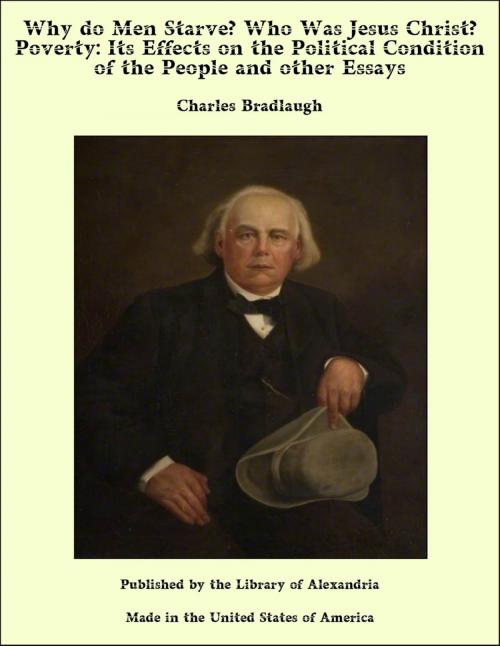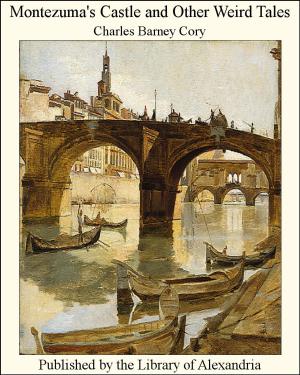Why do Men Starve? Who Was Jesus Christ? Poverty: Its Effects on the Political Condition of the People and other Essays
Nonfiction, Religion & Spirituality, New Age, History, Fiction & Literature| Author: | Charles Bradlaugh | ISBN: | 9781465585905 |
| Publisher: | Library of Alexandria | Publication: | March 8, 2015 |
| Imprint: | Language: | English |
| Author: | Charles Bradlaugh |
| ISBN: | 9781465585905 |
| Publisher: | Library of Alexandria |
| Publication: | March 8, 2015 |
| Imprint: | |
| Language: | English |
Why is it that human beings are starved to death, in a wealthy country like England, with its palaces, its cathedrals, and its abbeys; with its grand mansions, and luxurious dwellings, with its fine enclosed parks, and strictly guarded preserves; with its mills, mines, and factories; with its enormous profits to the capitalists; and with its broad acres and great rent rolls to the landholder? The fact that men, old, young, and in the prime of life; that women, and that children, do so die, is indisputable. The paragraph in the daily journals, headed "Death from starvation," or "Another death from Destitution," is no uncommon one to the eyes of the careful reader. In a newspaper of one day, December 24th, 1864, may be read the verdict of a London jury that "the deceased, Robert Bloom, died from the mortal effects of effusion on the brain and disease of the lungs, arising from natural causes, but the said death was accelerated by destitution, and by living in an ill-ventilated room, and in a court wanting in sanitary requirements;" and the verdict of another jury, presided over by the very Coroner who sat on the last case, "that the deceased, Mary Hale, was found dead in a certain room from the mortal effects of cold and starvation;" as also the history of a poor wanderer from the Glasgow City Poor House found dead in the snow. In London, the hive of the world, with its merchant millionaires, even under the shadow of the wealth pile, starvation is as busy as if in the most wretched and impoverished village; busy indeed, not always striking the victim so obtrusively that the coroner's inquest shall preserve a record of the fact, but more often busy quietly, in the wretched court and narrow lane, up in the garret, and down in the cellar, stealing by slow degrees the life of the poor. Why does it happen that Christian London, with its magnificent houses for God, has so many squalid holes for the poor? Christianity from its thousand pulpits teaches, "Ask and it shall be given to you," "who if his son ask bread, will he give him a stone?" yet with much prayer the bread is too frequently not enough, and it is, alas I not seldom that the prayer for bread gets the answer in the stone of the paved street, where he lays him down to die. The prayer of the poor outcast is answered by hunger, misery, disease, crime, and death, and yet the Bible says, "Blessed be ye poor." Ask the orthodox clergyman why men starve, why men are poor and miserable; he will tell you that it is God's will; that it is a punishment for man's sins. And so long as men are content to believe that it is God's will that the majority of humankind should have too little happiness, so long will it be impossible effectually to get them to listen to the answer to this great question.
Why is it that human beings are starved to death, in a wealthy country like England, with its palaces, its cathedrals, and its abbeys; with its grand mansions, and luxurious dwellings, with its fine enclosed parks, and strictly guarded preserves; with its mills, mines, and factories; with its enormous profits to the capitalists; and with its broad acres and great rent rolls to the landholder? The fact that men, old, young, and in the prime of life; that women, and that children, do so die, is indisputable. The paragraph in the daily journals, headed "Death from starvation," or "Another death from Destitution," is no uncommon one to the eyes of the careful reader. In a newspaper of one day, December 24th, 1864, may be read the verdict of a London jury that "the deceased, Robert Bloom, died from the mortal effects of effusion on the brain and disease of the lungs, arising from natural causes, but the said death was accelerated by destitution, and by living in an ill-ventilated room, and in a court wanting in sanitary requirements;" and the verdict of another jury, presided over by the very Coroner who sat on the last case, "that the deceased, Mary Hale, was found dead in a certain room from the mortal effects of cold and starvation;" as also the history of a poor wanderer from the Glasgow City Poor House found dead in the snow. In London, the hive of the world, with its merchant millionaires, even under the shadow of the wealth pile, starvation is as busy as if in the most wretched and impoverished village; busy indeed, not always striking the victim so obtrusively that the coroner's inquest shall preserve a record of the fact, but more often busy quietly, in the wretched court and narrow lane, up in the garret, and down in the cellar, stealing by slow degrees the life of the poor. Why does it happen that Christian London, with its magnificent houses for God, has so many squalid holes for the poor? Christianity from its thousand pulpits teaches, "Ask and it shall be given to you," "who if his son ask bread, will he give him a stone?" yet with much prayer the bread is too frequently not enough, and it is, alas I not seldom that the prayer for bread gets the answer in the stone of the paved street, where he lays him down to die. The prayer of the poor outcast is answered by hunger, misery, disease, crime, and death, and yet the Bible says, "Blessed be ye poor." Ask the orthodox clergyman why men starve, why men are poor and miserable; he will tell you that it is God's will; that it is a punishment for man's sins. And so long as men are content to believe that it is God's will that the majority of humankind should have too little happiness, so long will it be impossible effectually to get them to listen to the answer to this great question.















